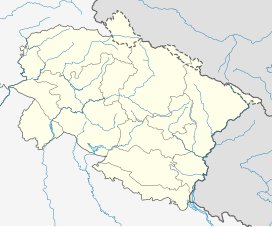Lipulekh Pass: Difference between revisions
Tags: Reverted Mobile edit Mobile web edit |
Reverted 2 edits by 2407:1400:AA64:5C18:30AC:396D:F75E:13B3 (talk): WP:POV and deletion of sourced content |
||
| Line 10: | Line 10: | ||
| elevation_ref = {{sfnp|Walton, Almora District Gazetteer|1911|p=229}} |
| elevation_ref = {{sfnp|Walton, Almora District Gazetteer|1911|p=229}} |
||
| traversed = |
| traversed = |
||
| location = Border between [[ |
| location = Border between [[India]] and [[Tibet Autonomous Region|Tibet]], China<ref name="LingAbdenur2016"/> |
||
| range = [[Himalayas]] |
| range = [[Himalayas]] |
||
| coordinates = {{coord|30.234080|81.028805|type:pass|format=dms |display=title,inline}} |
| coordinates = {{coord|30.234080|81.028805|type:pass|format=dms |display=title,inline}} |
||
| Line 174: | Line 174: | ||
| mark-description22 = Autonomous region of [[China]] |
| mark-description22 = Autonomous region of [[China]] |
||
}} |
}} |
||
'''Lipulekh La''' or '''Lipulekh Pass''' is a [[Himalaya]]n [[mountain pass|pass]] in the border between [[ |
'''Lipulekh La''' or '''Lipulekh Pass''' is a [[Himalaya]]n [[mountain pass|pass]] in the border between [[India]] on the northern border with [[Tibet Autonomous Region|Tibet]] region held by China.<ref name=Nd1/><ref name="LingAbdenur2016"> |
||
{{cite book|last1=Ling|first1=L.H.M.|last2=Abdenur|first2=Adriana Erthal|last3=Banerjee|first3=Payal|title=India China: Rethinking Borders and Security|url=https://books.google.com/books?id=IIsxDQAAQBAJ&pg=PA50|date=19 September 2016|publisher=University of Michigan Press|isbn=978-0-472-13006-1|pages=49–50}} |
{{cite book|last1=Ling|first1=L.H.M.|last2=Abdenur|first2=Adriana Erthal|last3=Banerjee|first3=Payal|title=India China: Rethinking Borders and Security|url=https://books.google.com/books?id=IIsxDQAAQBAJ&pg=PA50|date=19 September 2016|publisher=University of Michigan Press|isbn=978-0-472-13006-1|pages=49–50}} |
||
</ref> The '''Old Lipulekh Peak''' or '''Old Lipulekh Pass''', a [[Mount Kailash]] viewing point at 17,500 ft elevation, lies west of Lipulekh Pass.<ref name=Nd1>[https://www.ndtv.com/india-news/how-uttarakhand-is-providing-closer-darshan-to-kailash-mansarovar-pilgrims-4161928 How Uttarakhand Is Providing "Closer Darshan" To Kailash-Mansarovar Pilgrims], NDTV, 29 June 2023.</ref> The Lipulekh pass is near the trading town of Taklakot ([[Burang Town|Purang]]) in [[Tibet]] and used since ancient times by traders, mendicants and pilgrims transiting between |
</ref> The '''Old Lipulekh Peak''' or '''Old Lipulekh Pass''', a [[Mount Kailash]] viewing point at 17,500 ft elevation, lies west of Lipulekh Pass.<ref name=Nd1>[https://www.ndtv.com/india-news/how-uttarakhand-is-providing-closer-darshan-to-kailash-mansarovar-pilgrims-4161928 How Uttarakhand Is Providing "Closer Darshan" To Kailash-Mansarovar Pilgrims], NDTV, 29 June 2023.</ref> The Lipulekh pass is near the trading town of Taklakot ([[Burang Town|Purang]]) in [[Tibet]] and used since ancient times by traders, mendicants and pilgrims transiting between India and Tibet. It is also used by pilgrims to Kailas and [[Manasarovar]]. It is reached by the ''[[Gunji, Uttarakhand#NH|Pithoragagh-Lipulekh Pass Highway]] (PLPH)'', and a spur from [[Nabhidhang]] (Nabidhang) runs along a glaciated river to [[Om Parvat]]. The Mount Kailash in Tibet can be viewed from India from the ''Old Lipulekh Peak'' (via NH-9 motorable till the pass) which lies northeast of [[Gunji, Uttarakhand|Gunji]] and the [[Limpiyadhura Pass]]<!--NOTE: Retain RED LINK encourage article creation.--> (via [[Kuthi Valley]]) which lies northwest of Gunji.<ref name=Nd1>[https://www.ndtv.com/india-news/how-uttarakhand-is-providing-closer-darshan-to-kailash-mansarovar-pilgrims-4161928 How Uttarakhand Is Providing "Closer Darshan" To Kailash-Mansarovar Pilgrims], NDTV, 29 June 2023.</ref> The [[Sharda River|Kali River]] (Sharda River) rises from the Limpiyadhura northeast of Gunji and flows by the [[KMVN Huts]]<!--NOTE: Retain RED LINK to encourage article creation.--> (Kumaon Mandal Vikas Nigam resort) at Nabhidhang (a fork route from Nabhidhang goes southeast along the glaciated rivulet to Om Parvat), [[ITBP]] Base Camp, [[Indian Forest Service|Indian Forest Police]] Checkpost to Gunji. |
||
==Tourism== |
==Tourism== |
||
This pass links the [[ |
This pass links the [[Pithoragarh district]] India with the [[Tibet Autonomous Region]] of [[People's Republic of China|China]], and forms the last territorial point in India's territory. The ''Kailash Mansarovar Yatra'', a Hinduism pilgrimage to [[Mount Kailash]] and [[Lake Manasarovar]], traverses this pass. Lipulekh pass is connected to Chang Lobochahela, near the old trading town of [[Burang Town|Purang]] (Taklakot), in [[Tibet]]. |
||
== See also == |
== See also == |
||
Revision as of 18:12, 12 March 2024
| Lipu-Lekh Pass | |
|---|---|
| Elevation | 16,780 ft (5,115 m)[1] |
| Location | Border between India and Tibet, China[2] |
| Range | Himalayas |
| Coordinates | 30°14′03″N 81°01′44″E / 30.234080°N 81.028805°E |
| Lipulekh Pass | |||
|---|---|---|---|
| Simplified Chinese | 里普列克山口 | ||
| Traditional Chinese | 里普列克山口 | ||
| |||
Lipulekh La or Lipulekh Pass is a Himalayan pass in the border between India on the northern border with Tibet region held by China.[3][2] The Old Lipulekh Peak or Old Lipulekh Pass, a Mount Kailash viewing point at 17,500 ft elevation, lies west of Lipulekh Pass.[3] The Lipulekh pass is near the trading town of Taklakot (Purang) in Tibet and used since ancient times by traders, mendicants and pilgrims transiting between India and Tibet. It is also used by pilgrims to Kailas and Manasarovar. It is reached by the Pithoragagh-Lipulekh Pass Highway (PLPH), and a spur from Nabhidhang (Nabidhang) runs along a glaciated river to Om Parvat. The Mount Kailash in Tibet can be viewed from India from the Old Lipulekh Peak (via NH-9 motorable till the pass) which lies northeast of Gunji and the Limpiyadhura Pass (via Kuthi Valley) which lies northwest of Gunji.[3] The Kali River (Sharda River) rises from the Limpiyadhura northeast of Gunji and flows by the KMVN Huts (Kumaon Mandal Vikas Nigam resort) at Nabhidhang (a fork route from Nabhidhang goes southeast along the glaciated rivulet to Om Parvat), ITBP Base Camp, Indian Forest Police Checkpost to Gunji.
Tourism
This pass links the Pithoragarh district India with the Tibet Autonomous Region of China, and forms the last territorial point in India's territory. The Kailash Mansarovar Yatra, a Hinduism pilgrimage to Mount Kailash and Lake Manasarovar, traverses this pass. Lipulekh pass is connected to Chang Lobochahela, near the old trading town of Purang (Taklakot), in Tibet.
See also
References
- ^ Walton, Almora District Gazetteer (1911), p. 229.
- ^ a b Ling, L.H.M.; Abdenur, Adriana Erthal; Banerjee, Payal (19 September 2016). India China: Rethinking Borders and Security. University of Michigan Press. pp. 49–50. ISBN 978-0-472-13006-1.
- ^ a b c How Uttarakhand Is Providing "Closer Darshan" To Kailash-Mansarovar Pilgrims, NDTV, 29 June 2023.
Bibliography
- Walton, H. G., ed. (1911), Almora: A Gazetteer, District Gazetteers of the United Provinces of Agra and Oudh, vol. 35, Government Press, United Provinces – via archive.org



